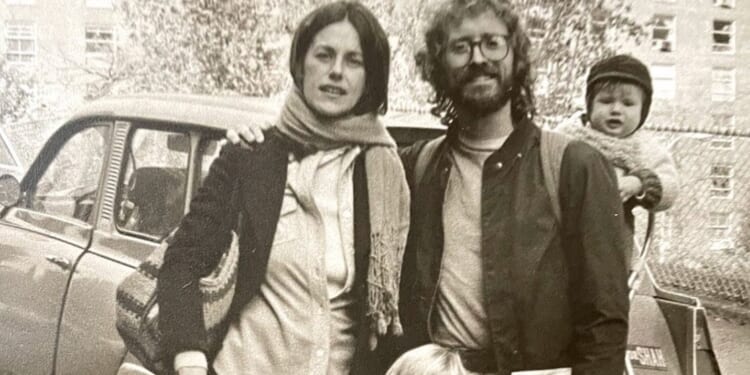The Weathermen, the best-known Left militant group that operated in the United States in the late Sixties and the Seventies, took its name from the Bob Dylan lyric “You don’t need a weatherman to know which way the wind blows,” from his 1965 song, “Subterranean Homesick Blues.” Paul Thomas Anderson’s new film, One Battle After Another, reimagines the Weathermen for today, along the way illuminating the unresolved impasses of the Sixties — between family and political commitment, violence and responsibility — that still confront the radical Left today.
In the film, former revolutionary Bob Ferguson (Leonardo DiCaprio) has long tried to escape his militant past with the radical cell known as the “French 75.” But when his daughter Willa (Chase Infiniti) is endangered, he gets pulled back into the underground. Bob’s earlier partner and fellow activist Perfidia Beverly Hills (Teyana Taylor), Willa’s mother, embodied the French 75’s Leftist creed, and Bob tagged along until the movement fractured, including a high‑profile operation at an immigration detention center that ignited a familiar Trump-style crackdown.
Years later, the group’s nemesis Col. Steven J. Lockjaw (Sean Penn) resurfaces, now aligned with a clandestine, far‑Right, racist “Christmas Adventurers Club” and determined to root out the French 75 and their progeny, especially Bob’s daughter Willa. The confrontation between the two forces feels ripped from the headlines, driving the Right to vituperate against the film and the Left to vaguely take up its protagonists’ cause.
Many reviewers have been searching for a movie that might have served as a model or predecessor for One Battle After Another; as far as I know, they’ve all ignored the obvious choice, Robert Redford’s The Company You Keep, from 2012. That film also deals with Leftist ex-radicals confronting their past. Simplified, the story centers on recent widower and single father, Jim Grant, a former Weather Underground anti-Vietnam militant wanted for a bank robbery and murder, who hid from the FBI for more than 30 years posing as an attorney in Albany, NY.
Jim becomes a fugitive when his true identity is exposed, and he must find and enlist the help of with his ex-lover, Mimi, the one person who can clear his name. Mimi is still passionate about the goals of the Weathermen and unapologetic about her actions 30 years earlier, but Jim has become a responsible family man.
Jim asks Mimi to give herself up in order to save him and his 11-year-old daughter, Isabel. He doesn’t want to leave Isabel behind and repeat the mistake that he and Mimi made 30 years earlier by giving up their own daughter. When Mimi confronts Jim about selling out, he tartly replies: “I didn’t get tired. I grew up.” In the film’s final scenes, Mimi flees the cabin she is sharing with Jim to sail to Canada, but she turns her boat around and returns to the United States to give herself up; the next day, Jim is freed from jail and reunites with Isabel.
It’s true that, as one reviewer put it with acerbic wit, The Company You Keep exudes nostalgia for the time when terrorists were still people who looked and were dressed like “us” and bore recognizable Anglo-Saxon names. The film nonetheless has an authentic touch in its wistful, painful rendering of the disappearance of the radical Left from our political and ideological reality: these militant survivors are like sympathetic living dead, remnants of another era, strangers drifting in a strange world. No wonder Redford was attacked by conservatives for glamorizing terrorists. The film’s authenticity is evident not only in the generally sympathetic portrayal of ex-Weathermen, but even more in wonderful narrative details like the meticulous descriptions of underground life (how to check if one is trailed and shake off possible pursuers; how to create a new identity; and so on).
The film fails, however, to confront the most problematic aspect of Weathermen activity: the group’s decision to take up violent action. While the film obviously sympathizes with the radical Leftist cause, its predominant tone is a rejection of violence, framed in terms of maturation, of the passage from youthful enthusiasm (which can easily turn into violent fanaticism) to mature awareness that there are things like family life and responsibility towards one’s children that no political cause should make us violate. Or as the hero says to his ex-lover: “We have a responsibility beyond the Cause. We have a baby.”
Read in this way, The Company You Keep is, as someone wrote about Neil Gordon’s novel upon which the film is based, le roman des illusions perdues, a novel of lost illusions.
But is the injunction to grow up, embrace family responsibility, etc., really a neutral apolitical wisdom that posits a limit to our political engagement? Or is it, rather, a way for ideology to intervene, preventing us from analyzing to the end the morality of violent resistance?
An honest analysis would not covertly attempt to justify violent terror by hiding behind family-values virtue-signaling, but has an obligation to analyze and judge it on its own terms. Let us imagine that Jim were to have no daughter — the problem of Weathermen strategy would remain. Without this type of radical self-examination, we end up endorsing the existing legal and political order as the frame that guarantees the stability of our private family lives. It’s telling that The Company You Keep is about the hero’s legal rehabilitation, about his effort to become a normal citizen with no dark past haunting him. He’s grasping for a happy ending, and the film supplies one in Hollywood style: the main figures go public, are soon liberated, and find a place in society.
In One Battle After Another, however, as the title of the film clearly indicates, the battle goes on: Willa takes the torch and continues the underground struggle. There is another change: in The Company You Keep, Weathermen fight against the imperialist system itself, while in One Battle After Another, the contemporary descendants focus on helping the illegal Latino immigrants to avoid expulsion and find a place in the US homeland. In other words, they are not working against the system as such, they work to enable immigrants to integrate into the system. And since the system is not the enemy, the enemies of the revolutionaries are not just grey bureaucratic enforcers of the law displaying the banality of evil, i.e., what we perceive as the “normal” structure of power. Rather, they are ridiculous figures caught in obscene enjoyment, living caricatures.
Penn’s Steven Lockjaw combines excessive masculinity and sexual desire with nervous gestures signaling that he is all the time close to a psychic breakdown; the Christmas Adventurers Club is a fantasized caricature of an elite racist group that has no place in today’s global society where black and Asian men and women can also occupy top positions of power (Rishi Sunak, Kemi Badenoch, Usha Vance).
Steven’s sexual attraction to Perfidia — he at one point forces her to have sex with him — is particularly revealing. Steven is totally obsessed by Perfidia since she embodies a Leftist revolutionary version of his own wild subjectivity. Only, she lacks his inner obstacles and nervous tics, and thus freely enacts what during the 1968 eruptions in France was called jouir sans entraves, “enjoying without obstacles.” There is no gap for her between her violent political activity and intense promiscuousness — she fully enjoys reckless sex in the midst of a “terrorist” act, following the same stance also in how she talks, seamlessly combining brutal acts with dirty speech. Her shifting identity leaves no space for a permanent partner, and no wonder that she betrays even her revolutionary Cause. After the betrayal, she is given by the government a new identity and sanctuary, but she disappears even from there, so that nobody knows where she is….
“Perfidia impersonates the excessive and destructive logic of today’s capitalism at its purest.”
As such, Perfidia also embodies the form of the film — or, as the critic Pietro Bianchi says, “Perfidia’s role should not be interpreted primarily at the level of content, but rather structurally. All the narrative events set in motion throughout the film depend on the consequences of her actions, but equally on her absence. Every character is thus forced to orbit around the void she creates — with the odd result that the true protagonist of the film appears on screen for no more than twenty minutes, at the beginning.”
Therein resides the falsity of the film: as its “absent center” (as Bianchi puts it), Perfidia is a masculine fantasy constructed to cover up what Lacan called the feminine non-all, the hysterical fragility of the feminine subjectivity. Perfidia is precisely the dream of a Woman as all, of a woman who is phallus. It is crucial to note that, if we take away from the story its “absent center,” the spectacular plurality of its excessive inconsistent actions falls apart. The gap that separates the two films is most palpable at the level of form: while The Company of Men remains firmly within the constraints of the standard psychological realism, One Battle After Another is, as Peter Bradshaw noticed, “at once serious and unserious, exciting and baffling, a tonal fusion sending that crazy fizz across the VistaVision screen — an acquired taste, yes, but addictive.”
The film is full of crazy brilliant moments — not just the hypnotic car chases, but also the convent of revolutionary nuns who practice how to use machine guns. It really introduces a new way of telling a story, as it unfolds in an inconsistent plural space where brutal obscenity can coexist with pathetic humanist engagement.
Yet this formal excess aims at dazzling and fascinating us, so that we ignore the ambiguity of the film’s ethico-political stance. It is easy to propose, in the manner of the late Frederic Jameson, that the inconsistent dispersed plurality of the film bears witness to the fact that today’s global financial capitalism can no longer be narratively presented as a totality, so that the film’s failure to properly represent the society it depicts is in itself an indicator of the truth of this society: an indicator of the fact that today what Jameson called “cognitive mapping” of our situation is structurally impossible.
However, Perfidia as the film’s “absent center” mystifies this impossibility — Perfidia acts as a universal mediator of the film’s dispersed content; she impersonates the excessive and destructive logic of today’s capitalism at its purest. Compared with her, the “bad” figures like Steven Lockjaw and members of the Christmas Adventurers Club are pale shadows of this logic. It is difficult to imagine a more antifeminist film than One Battle After Another.
At the very end, Bob gives Willa a letter of hope from Perfidia, in which she apologizes for her actions and vows to reunite with her family in the future. Is this a letter which arrives at its destination, as Lacan would have put it, a letter which announces a pacifying denouement, or just another irrelevant promise? What will happen if Perfidia really returns to Steven and Willa? Will they be a happy family where the daughter will just disappear from her job, from time to time? I presume that the film on purpose leaves this open, that it is irrelevant to its logic. One Battle After Another, like The Company Of Men, ends in a tension between revolutionary spirit and parental moral responsibility, but while The Company Of Men implicitly proposes a formula (yes to revolutionary engagement, but an engagement which should not violate parental responsibility), One Battle After Another merely juxtaposes multiple stances and playfully stages their interaction.
So what about love between revolutionaries? From what we know about love among the Bolshevik revolutionaries, something unique took place there, a new form of love-couple emerged: a couple living in a permanent emergency state, totally dedicated to the revolutionary Cause, ready to sacrifice all personal sexual fulfillment to it, even ready to abandon and betray each other if Revolution demanded it — but simultaneously, totally dedicated to each other, enjoying rare moments together with extreme intensity. The lovers’ passion was tolerated, even silently respected, but ignored in the public discourse as something of no concern to others. There are traces of this even in what we know of Lenin’s affair with Inessa Armand.
The title of Freud’s short text from 1914 “Remembering, Repeating and Working Through” provides the best formula for how we might navigate these disjunctures. In our case, the trauma to be worked through is that of Weathermen. Redford’s earlier film engages in nostalgic remembrance but fails to resolve the key dilemma. One Battle After Another tries to fill in this gap by directly repeating the traumatic memory: the movie imagines how Weathermen would look today, in a radically different historical situation, and also ends in a failure.
What is needed is an actual grappling with the trauma: an analysis of what was wrong in the Weathermen experience itself. Here, we should proceed in a ruthless way that will hurt many Leftist sensibilities: the real Weathermen were focused on anti-imperialist resistance, especially in Vietnam, but today, with the exploding crises in decolonized Third World countries, we can see that anticolonial struggle also had deep limitations, which is why it often ended in authoritarian and corrupted new regimes.
Violent help to illegal immigrants is also problematic: it helps big capital (providing cheap labor and lowering the wages of American workers through arbitrage) and simultaneously gins up support for Trumpian populists. While I am fully aware that often violence is often needed and fully justified, I suspect that in today’s United States, direct small-scale single acts of violence like those practiced by the Weathermen have no chance against the Trumpian state and would only serve to intensify its brutal logic and oppressive measures. They amount to a public request to the White House: “Please send the National Guard to our town!” The focus, instead, should be on sabotaging the corporate digital control over our lives.
In short, there is nothing revolutionary in One Battle After Another. Today, we need weathermen to learn which way the wind blows. One Battle After Another depicts a group with no weatherman giving them orientation. With its helter-skelter form it celebrates disorientation itself as radical freedom.

















